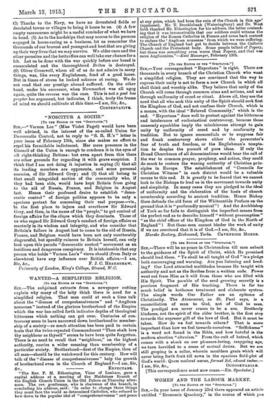WANTED—A SIMPLIFIED RELIGION.
[To rrze Enna or rar .13rronroa."1
fire—The subjoined extracts from a newspaper cutting explain why many of the laity think there is need for a simplified religion. That men could at such a time talk about the "disease of comprehensiveness" and "Anglican nonsense" instead of the glorious brotherhood of the Empire which the war has called forth indicates depths of theological bitterness which nothing Can get over. Centuries of con- troversy seem to have narrowed down brotherhood to member- ship of a society—so much attention has been paid to certain texts that the twice-repeated Commandment "Thou shalt love thy neighbour as thyself" seems to have been quite forgotten. There is no need to recall that "neighbour," on the highest authority, carries a wider meaning than membership of a particular society. Brotherhood—first of the Empire, then of all men—should be the watchword for this century. How will talk of the "disease of comprehensiveness" help the growth of brotherhood even in the Church of England P—I am, Sir,
EEPECTANS.
" "The Rev. F. EL Ethorington, Vicar of Lanham, gave a capital address at a meeting of the biaidstone Branch of the English Church Union in the Old Palace on Thursday after- noon. The rev, gentleman, who is chairman of the branch, in concluding his address, said: 'In order to change these things they must face the world as determined Catholics, who refused to bow down to the popular idol of "comprehensiveness " and peace
at any price, which had been the ruin of the Church in this age' (applause). Mr. T. Brocklebank (Wateringbury) and Dr. West both thanked Mr. Ethorington for his address, the latter contend- ing that it was inconceivable that our soldiers could witness the religion of the Roman Catholics in Franco and come back content to endure the'Anglican nonsense 'from which we were suffeting. The Church of England had got to decide between the Catholic Church and the Protestant body. Some people talked of Popery. but there was something even worse than Popery, and that was mere Anglicanism."—Kent Messenger, February 13th.


































 Previous page
Previous page